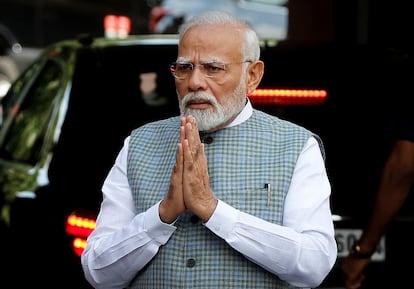Modi: From prime minister to king of Bharat
The Indian leader’s track record of inflaming religious tensions in order to cling to power is growing increasingly dangerous

Once upon a time, a king was bathing in the river when a badly wounded deer came down to the water to give birth. Overwhelmed with compassion, the king adopted it as his pet. Over time, he became so attached to the deer that at his death, his last sensation was his boundless affection for the animal. For this reason, the legendary King Bharata — the first ruler to unite India — was to be reincarnated as a deer.
We are here, of course, in the world of myth and legends, but also of reality. Because King Bharata’s name gave rise to Bharat, India in Sanskrit. It means “the lands of King Bharata.”
Bharat is the name that Narendra Modi, the prime minister of India, may be considering as his country’s official name. There are many ways to practice populism, and this is one of them. It’s a way to demonstrate power, to nourish narratives that demonize the country’s recent past and commemorate the glorious days of the distant past. It also serves to create debates that distract public opinion from the government’s mounting list of daily failures. Thus, Persia became Iran, Burma became Myanmar, Venezuela became the Bolivarian Republic of Venezuela and so on.
Modi’s political party is the Bharatiya Janata Party, is the Bharat People’s Party, or in other words, the Hindu People’s Party. And this whole family of words — Bharata, Bharat, Bharatiya — have the same religious origin: they all come from the sacred writings of Hinduism, starting with the Mahabharata, something like the Old Testament of that religion, which is essentially the epic of the Bharat kingdom.
And here’s the problem: India today, the most populous country in the world, is a much more diverse nation than it was in the times of legend. It contains a staggering 950 million Hindus, who form the support base of Modi’s Hindu Nationalism. But it is also home to 170 million Muslims — more than in Iran and Saudi Arabia combined — as well as 28 million Christians, 20 million Sikhs, eight million Buddhists, and many smaller groups. Trying to impose a purely religious term like Bharat to designate the entire country is an aggressive act of chauvinist populism. In short, ignoring the national identity of the more than 200 million non-Hindu citizens of India is a dangerous provocation.
None of this is surprising because religious chauvinism has been Modi’s stock-in-trade since his career began. In 2002, when a series of riots between religious communities shook the state of Gujarat, then-governor Modi stood by while more than 1,000 Muslims were murdered by hordes of angry Hindus. The lesson that Modi took from this tragedy was manifested in his political behavior: the more cruelty he showed towards the Muslim minority, the more electoral victories he was able to rack up.
Modi’s BJP government has never stopped inflaming religious tensions because it knows it’s a tried-and-true method of clinging to power. Through a gigantic social media machine, the BJP and its sister organizations fuel tensions between religious communities every time an election looms. WhatsApp chains spread explosive rumors about sexual abuse perpetrated by Muslim pedophiles against Hindu girls, and of course they underline Muslims’ voracious appetite for beef, since cows are considered sacred in Hinduism.
And Hindu revanchism doesn’t just target Muslims. In June, Indian secret agents allegedly murdered Hardeep Singh Nijjar, a well-known Sikh community leader, in broad daylight in a quiet suburb of Vancouver, Canada. The Canadian government’s outrage and the ongoing volley of accusations between the two countries has created a diplomatic incident that is expanding across the globe, introducing unprecedented tensions between India and Western partners that, until recently, were friends.
Modi has perfected the techniques of populism, polarization and post-truth, and continues to use them to hold on to power. Trying to change the name of India to a purely Hindu term like Bharat fits perfectly into this pattern of behavior that is endangering Gandhi’s democratic legacy. And all this in the name of King Bharata, who just wanted to take care of an orphaned deer.
Tu suscripción se está usando en otro dispositivo
¿Quieres añadir otro usuario a tu suscripción?
Si continúas leyendo en este dispositivo, no se podrá leer en el otro.
FlechaTu suscripción se está usando en otro dispositivo y solo puedes acceder a EL PAÍS desde un dispositivo a la vez.
Si quieres compartir tu cuenta, cambia tu suscripción a la modalidad Premium, así podrás añadir otro usuario. Cada uno accederá con su propia cuenta de email, lo que os permitirá personalizar vuestra experiencia en EL PAÍS.
¿Tienes una suscripción de empresa? Accede aquí para contratar más cuentas.
En el caso de no saber quién está usando tu cuenta, te recomendamos cambiar tu contraseña aquí.
Si decides continuar compartiendo tu cuenta, este mensaje se mostrará en tu dispositivo y en el de la otra persona que está usando tu cuenta de forma indefinida, afectando a tu experiencia de lectura. Puedes consultar aquí los términos y condiciones de la suscripción digital.









































